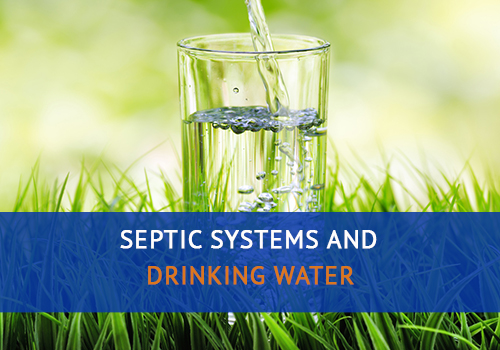Groundwater makes up the majority of Florida’s drinking water. There are a lot of factors that can go into the quality of your drinking water – storms, runoff, seasons, sediments, and nutrients, also on that list, septic systems and drinking water.
According to the Florida Department of Health, Florida is home to 2.6 million septic systems in the United States. This means that Florida makes up 12% of the United States’ septic systems. Therefore septic system health and clean water quality should be a high priority for septic owners.
If you’re a septic system owner, you’re probably asking what you can do to ensure you keep your drinking water clean. Let’s get into it by first looking at how a septic system works.

How Your Septic System Works
Your septic system is made of three main parts:
1. The Household
Your household is where the wastewater comes. Wastewater includes solid waste and liquid waste. Using your shower, toilet, sinks, or washing machine produces wastewater that is carried to the septic tank through drainage pipes.
2. Septic Tank
Once the wastewater is in the septic tank, it will remain here until safely decomposed by the effluent bacteria. Once the wastewater is clear to pass through the septic filter, it makes its way to the drain field.
3. Drain field
The drain field is an area of land made of perforated pipes and a ground material, like soil, gravel, or sand. The drain field is the last step in removing purities from the wastewater. Here, the water is leached from the pipes and further filtered back into the ground.
If you want to see an in-depth understanding of how your septic system works, take a look at our article on septic tank systems.
This still doesn’t answer what you can do to keep your groundwater safe and refreshing when septic systems and drinking water meet (or instead don’t meet). Let’s take a look at what you can do!
Septic Systems and Drinking Water: 6 Tips for Keeping Your Groundwater Clean
1. Know the Septic Regulations
Wells and large bodies of water are the primary source of potable drinking water for many. And, you guessed it – there are state requirements that say that septic owners must place their septic systems at least 75 feet from these water sources.
Septic systems will need repairs. It’s just a fact. Replacing parts of your septic system is something you may encounter. Or, perhaps you’re planning on a building project on a new property. You’ll need to know what Florida official law requires from a septic property owner.
It can get tricky navigating building rules and regulations on your own. Make sure to hire a professional who knows Florida State regulations and laws when it comes to septic systems.
2. Check the Quality of Drain Field Soil
Remember that your drain field is the last leg in the filtering process of your septic system before the wastewater is reabsorbed. An essential quality of the ground soil is permeability. Sometimes the natural ground soil around your order isn’t excellent quality. Contact a professional to check the soil and status of your drain field to avoid any hiccups.
3. Look Out for System Clogging
Clogging happens to a septic system if the homeowner hasn’t been performing proper maintenance on the septic pipes. A clog could lead to system failure, which you want to avoid at all cost.
Some clogging signs can be slow drains, water backup, standing water in the drain field, and putrid odors. Keep in mind that some of these signs don’t always mean you have a significant problem. Sometimes they’re a quick fix with a plunger. To figure that out on your own, take a look at our article on who to call when you have a floor drain issue.
4. Conserve Water
Conserving water makes sure that you don’t overload your septic system. Practicing household water conservation ideally will extend the life of your septic tank and drain field too.
5. Obey the Do Not Flush List
To keep your septic system healthy and consequently your drinking water, do not put hazardous or un-flushable products down your drains. Be conscientious when flushing the toilet or running the garbage disposal.
Not sure what you should keep out of your system? Check out our Do Not Flush Rules.
6. Schedule Regular Maintenance
If you have a septic system, you probably already have a septic service company that you regularly see. Septic pumps and yearly inspections are the easiest and most efficient ways to stay on top of septic problems.
If you’re new to the septic game or if you’ve been in it for a while, give us a call at Advanced Septic Services. We’d be happy to talk about your septic system’s needs.

